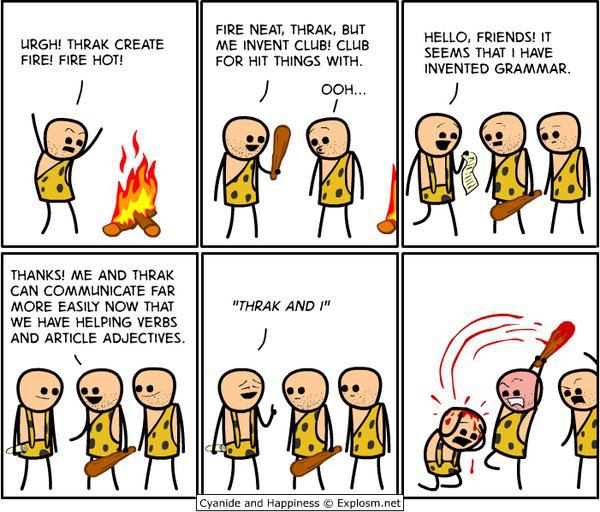Why there is no room in techcomm for the grammar police
You’re probably thinking that as a technical writer my biggest pet peeve would be the misuse of effect and affect or that I’d have a strong opinion about the Oxford comma. Nope. My biggest pet peeve and the behavior I have the strongest opinion about relates to the correcting of grammar.

Grammar Police Bad!
In addition to being a technical writer, I’m also an instructional designer, so I have a deep appreciation for the power of feedback. The article by FastCompany tilted How Yelp Encourages Users To Write More Thoughtful Reviews highlights the benefit constructive feedback provides compared to the damage destructive feedback provides. When I mentor new technical writers, one of the first pieces of advice I give is to avoid correcting the grammar of others, and here’s why I give this advice.
1. The conversation killer
Implying or stating that someone is wrong is the fastest way to end a conversation. As soon as a person feels that you are challenging, correcting, or judging them or their work, they often stop listening and divert their mental effort to preparing a defense or identifying qualities of the accuser that would negate the value of anything that the accuser shares. In other words, I’m not wrong because of the reasons I can outline here, and you’re an idiot, so who cares what you say, anyway. Once listening stops, communication stops. Once communication stops, the relationship dies. A good part of my job as a technical communicator is collaborating with others. In order to collaborate, I need to communicate. Therefore, I need to be very mindful of the appearance that I am “correcting” the work of others. In addition, my aim is to construct information that is easy to understand. I may have advice and recommendations regarding word choice and sentence structure, but I try never to imply that I’m correcting the work of another author. I am here as the champion of the user, and I’m also here as a guide and advisor to the original content contributor(s). My goal is to improve readability, not to correct grammar.
2. The problem finder (versus the problem solver)
There is very little value in just finding problems, but there is much value in solving problems. Solving problems requires time and commitment. It involves serving others. The best editor I ever worked with didn’t just circle typos and add or remove commas. He took the time to educate his writers and make them better content developers. For example, if I didn’t follow a particular style guideline, he would refer me to the page in the style guide with the proper construction. Therefore, I had no excuse for making the mistake again. In other words, he identified a knowledge gap and then he helped me fill the gap. If you are only interested in finding mistakes, but not ensuring that those mistakes do not occur again, then what value are you really adding? For example, I saw a viral post on Twitter involving grammar shaming. An individual had taken the initiative to write what he felt would be helpful instructions for his co-workers, and then taped the instructions on an appliance in a break room. Another co-worker came along and highlighted all the grammatical mistakes in the note, and then photographed the note and shared it with others. I’m assuming with the intent to ridicule the original author. This example is a good transition to my last point.
3. The bully
I’ve worked on teams with people who are so smart that they are literally frightening, and technology that is so advanced that it takes many to understand and create the parts, and very few who can understand and operate the whole. I’m reminded on a daily basis how much knowledge and information there is and how very little that I have accumulated and mastered. Does this make me feel self-conscious and insecure? Yes. Does this insecurity drive me to bully and belittle others to make myself feel superior? I hope not.
Think about how you want others to perceive you and what value you want to add. Always consider if the feedback you’re providing is constructive or destructive.
Resources:
- Grammar snobs are patronising, pretentious and just plain wrong – video (via the Guardian)
- 4 Reasons Why Grammar Police Make Terrible Writers (via Making a Living Writing)
- Being the grammar police (via The Daily Post)
- Grammar Police Brutality (by Mary Rolf via Medium)
- Why I retired as a grammar police (via Just Dandy)
- My problem with the grammar police (by Bronwen Clune via The Guardian)
- Grammar Police –Zealousness over correctness (by Merrill Perlman via Columbia Journalism Review)
- This Embarrasses You and I* (by Sue Shellenbarger via Wall Street Journal)
- I Won’t Hire People Who Use Poor Grammar. Here’s Why (by Kyle Wiens via Harvard Business Review)
- I Don’t Tolerate Poor Grammar (by Cheryl Conner via Forbes)
- The Importance of Low-stake Feedback (by Katrina Schwartz via MindShift)
- Does Complaining Damage Our Mental Health? (by Guy Winch via Psychology Today)
- How to Give Feedback (by Jessica Haby via Forbes)
- How to give feedback that builds trust, not destroys it (by Randy Conley via Leading With Trust)
- Grammar Scolds Unite! (Podcast via Lexicom Valley)
- Fix Your Grammar (Glove and Boots Video about Grammar)
- “Word Crime” (Weird Al’s Video Parody)
- 7 Deadly Sins of Speaking (Video of Julian Treasure’s TEDx presentation) )
- Who Votes for New Words (Video of Mignon Fogarty’s TEDx presentation)
- Why Wikipedias grammar Vigilante is Wrong (by David Shariatmadari via The Guardian)